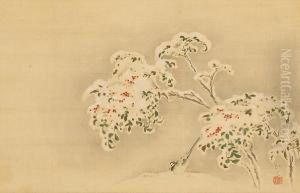Tanaka Totsugen Paintings
Tanaka Totsugen was a Japanese painter and poet known for his contributions to the nanga (literati painting) movement in 18th century Japan. Born in 1709, Totsugen grew up during a period when Japan was under the rule of the Tokugawa shogunate, a time characterized by peace, isolation from the outside world, and a flourishing of the arts under the patronage of the samurai class. Totsugen's work reflects the intellectual and artistic pursuits that were valued by the literati class, who were deeply influenced by Chinese Confucian and Taoist thought, as well as by Chinese artistic traditions.
Totsugen was not just a painter but also a skilled poet and calligrapher, embodying the ideal of the Chinese literati, or wenren, who excelled in multiple artistic disciplines. His paintings often featured landscapes, flowers, and birds, executed in the free and expressive style characteristic of nanga painting. This style emphasized spontaneity, simplicity, and a deep appreciation of nature, drawing on the principles of Zen Buddhism and Taoism to express the artist's inner feelings and philosophical musings. Totsugen's art was marked by its elegant brushwork and the use of light ink washes, which gave his paintings a sense of ethereal beauty and transient melancholy.
Despite his talents, Totsugen lived much of his life in relative obscurity, a fate not uncommon for nanga artists, who often prioritized personal expression and scholarly pursuits over fame or wealth. However, his work has gained greater recognition in the centuries following his death in 1776, appreciated for its delicate beauty and its embodiment of the ideals of the nanga movement. Today, Tanaka Totsugen is remembered as a significant figure in the history of Japanese art, whose paintings and poetry continue to inspire admiration for their depth, subtlety, and refined elegance. His legacy contributes to our understanding of the cultural and intellectual currents of Edo period Japan, highlighting the rich interplay between art, nature, and philosophy that characterized this era.
